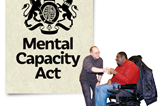Easy Read Preparing for Adulthood
About
Preparing for Adulthood is a key element of the Special Educational Needs and Disabilities (SEND) reforms that aims to improve young people’s achievement of the four key life outcomes. More information on the key life outcomes can be found at www.preparingforadulthood.org.uk
- Employment and further education
- Living independently
- The best health possible
- Having friends and relationships and being able to participate in the local community
The process includes the preparation and planning needed to support young people to move from school to further education choices such as sixth form or college and university. The needs of the young person are dependent on this and it may include the move from children’s social care and paediatric health services to adult social care and health services. We are committed to young people with SEND reaching their aspirations and ultimately preparing them for adulthood. We will do this through enabling, supporting and empowering young people to develop the skills required and help them move successfully through education. For some young people with the most complex needs, it is important to provide meaningful opportunities and celebrate the small steps towards enhancing independence and having a quality life experience.
The SEND Code of Practice Chapter 8 highlights the need for this preparation to start early and centre on the young person’s own aspirations, interests and needs.
The Department for Education Outcomes chart (PDF) illustrates the preparing for adulthood outcomes across the age ranges for children and young people with SEND.

Mental Capacity
‘Mental Capacity’ is the ability to make a decision. Under the Children and Families Act, 2014, a child becomes a young person once they reach the end of compulsory school age (i.e. the last Friday of June, in the academic year the child turns 16). At this point, the young person is deemed capable of making decisions about their future, with the involvement of the young person’s family. Parents/carers should continue to be involved in discussions about the young person’s future; for example, the young person may ask their parent/carers to help them by attending meetings with them, filling in forms or receiving correspondence on their behalf.
A Mental Capacity Assessment can be undertaken to determine a young person’s ability to make important decisions. If it is agreed that a young person does not have capacity to make important decisions about their educational and other needs, then parents or carers will make decisions on their behalf.
Further information on the Mental Capacity Act can be found at
www.gov.uk/government/collections/mental-capacity-act-making-decisions

Raising the Participation Age
Under the Government policy Raising of the Participation Age (RPA) begins in Year 11 means (or years below), this means that every young person is now required to stay in some form of learning until they are 18. The options are, staying in full-time education, such as school, college, apprenticeships, work-based learning, part-time education or training if they are employed, self-employed or volunteering for at least 20 hours a week. This is to support young people fulfil their potential, regardless of their background or life circumstances. RPA is not the same as raising the school leaving age. The school leaving age is the same and young people can leave school on the last Friday in June if they are 16, after year 11 and choose the post-16 option that is best for them.
What will this include for children and young people in Wakefield?
We aim to work in partnership with all stakeholder groups with a view to better preparing children and young people with SEND for adulthood. We will enable, empower and support young people to:
- Reach a level of academic attainment which will commensurate with their underlying abilities and support their aspirations
- Attain the skills they need to move successfully through their education; and follow accredited and vocational opportunities through participation in volunteering opportunities; work tasters, work experience/placements; supported internships; traineeships, apprenticeships; job coaching; and substantive employment.
- Develop the skills and confidence they need to become as independent as possible with reference to travel; increasing their ability to organise, plan and effectively manage their daily activities, including, managing their finances, cooking and cleaning; living on their own or with others; and developing and maintaining positive relationships with friends and others into adult life
- Become and continue to be active citizens; residing and participating in their local communities in addition to making a positive contribution to the development and improvement of them and make independent choices and decisions in an adult context
- Be safe and able to maintain a healthy lifestyle by taking responsibility for their own health and well-being and understand what health services are available to support them - including mental health services
Our Journey to adulthood illustrates the route that all children and young people from early childhood follow as they go through the preparing for adulthood process. Following from this we need a carefully planned transition pathway that encompasses the journey into adult life.
A child or young person has special educational needs if they have a learning difficulty or disability which requires special educational provision to be made. This could be to do with a range of difficulties including, behaviour or their ability to play with other children, academic progress, and ability to understand, concentrate or perhaps their physical aptitude is affected in a way that makes it difficult for them to learn. They may receive support through SEN Support or for more complex need through an EHC plan.
